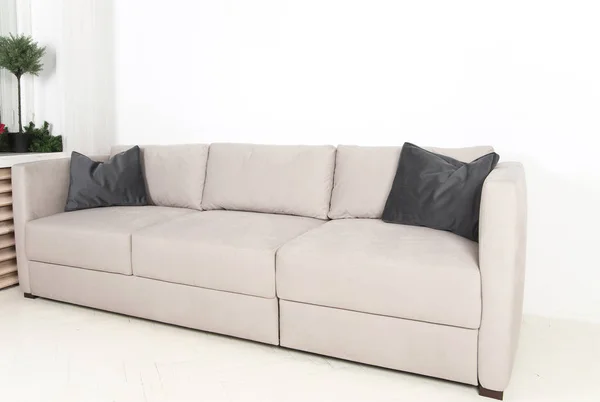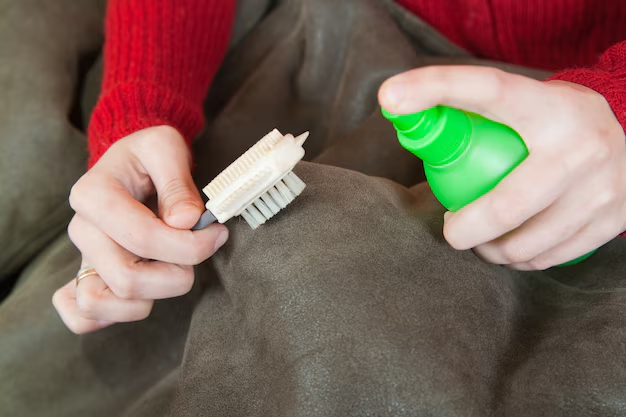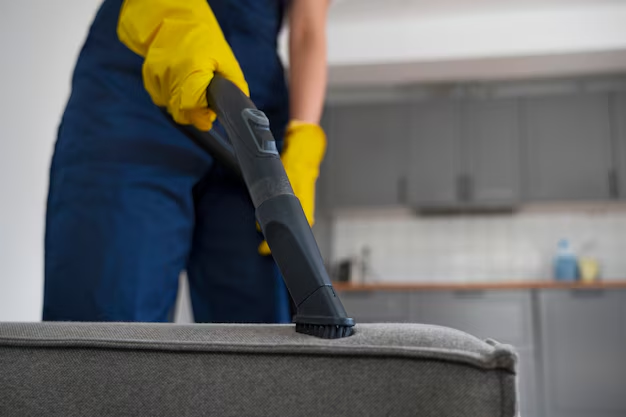A fresh, odour-free sofa ensures a healthy, comfortable and inviting home environment. Unpleasant sofa smells can not only affect your comfort but also impact your health and, believe it or not, the longevity of your furniture. Understanding the common causes of sofa odours and taking preventive measures can help you maintain a fresh and inviting home.

In this article, we’ll explore the different causes of sofa smells and the benefits of odour removal. You’ll also learn some effective methods for getting rid of that smell and preventing it from coming back.
Common Causes of Sofa Odours
Sofas can develop unpleasant odours due to various reasons. Identifying these causes is essential for effectively addressing the problem and restoring freshness to your furniture.
Everyday Sources of Odours
- Food spills and stains – Accidental spills from snacks or drinks and failing to clean them promptly can create a breeding ground for bacteria and lead to lingering smells.
- Pet-related smells – Pets contribute significantly to sofa odours through dander, urine accidents, or simply their natural scent.
- Smoking and environmental factors – Cigarette smoke and other strong odours can permeate the fabric, resulting in persistent smells.
Microbial Causes
Bacteria, mould and mildew thrive in damp and poorly ventilated environments. Sofas exposed to excessive moisture can develop these microorganisms within their fabric or stuffing. The buildup of bacteria not only creates foul smells but can also trigger allergies or respiratory issues in sensitive individuals.
Prolonged Use and Neglect
Over time, sofas accumulate sweat, body oils, dust and debris from regular use. Without proper deep cleaning, these substances can create a musty odour that becomes increasingly difficult to remove.
Benefits of Odour Removal
Removing odours from your sofa offers numerous advantages (both immediate and long-term) that enhance your health and comfort. Here are some of them:
1. Improved Health and Hygiene
Eliminating unpleasant odours from your sofa contributes to a healthier living space by reducing the presence of allergens and bacteria. Removing odours can also help alleviate respiratory issues and allergies.
2. Enhanced Comfort and Environment
A fresh-smelling sofa creates a more inviting and pleasant atmosphere at home. By eliminating foul odours, you can relax and enjoy the comfort of your sofa without any unpleasant distractions.
3. Prolonged Furniture Lifespan
Odours can penetrate deep into the fabric of your sofa, potentially deteriorating its quality over time. By removing the smell, you can help extend the longevity of your sofa.
4. Economic and Environmental Benefits
Rather than investing in new furniture, odour removal allows you to revitalise and refresh your sofa, saving you money in the long run. Additionally, by extending the lifespan of your furniture, you contribute to reducing waste and promoting a more sustainable approach to consumption.
Odour Removal Methods
There are several effective methods to tackle sofa odours, ranging from do-it-yourself (DIY) approaches to professional deep cleaning services. Each method has its merits and works in varying degrees depending on the severity of the odour, the material of your sofa and your budget. Let’s explore these methods in detail to help you choose the right solution for your cleaning needs.
DIY Solutions
DIY methods are budget-friendly and convenient for addressing mild to moderate odours. Here are some effective techniques to deodorise your sofa at home:
Using Baking Soda
Baking soda is a natural deodoriser that absorbs odours effectively.
How to Use:
- Vacuum the sofa thoroughly to remove dust and debris.
- Sprinkle baking soda generously over the upholstery.
- Let it sit for 15-30 minutes (or overnight for strong odours).
- Vacuum again to remove the baking soda, along with trapped odours.
Vinegar and Essential Oils
White vinegar neutralises odours, while essential oils add a fresh scent.
How to Use:
- Mix equal parts of white vinegar and water in a spray bottle.
- Add a few drops of your favourite essential oil (e.g., lavender, lemon).
- Lightly spray the mixture onto the sofa, taking care not to soak the fabric.
- Get rid of excess moisture and allow the sofa to air dry in a well-ventilated space.
Steam Cleaning
Steam cleaning is a powerful method to sanitise and remove odours from fabrics and other surfaces.
How to Use:
- Rent or purchase a steam cleaner suitable for upholstery.
- Follow the manufacturer’s instructions for cleaning.
- Use the appropriate setting for your sofa’s fabric to avoid damage.
Activated Charcoal or Odour-Absorbing Products
- Place small bags of activated charcoal or odour-absorbing gel near your sofa to neutralise persistent smells over time.
Regular Maintenance
- Vacuum your sofa weekly to prevent the buildup of dust and debris.
- Spot-clean spills immediately to avoid stains and odours.
Professional Deep Cleaning Services
Professional sofa cleaning service companies offer specialised solutions for deep-seated odours or extensive cleaning needs. These services are ideal for stubborn smells caused by bacteria, mould or years of irregular cleaning.
Techniques Used by Professionals
- Steam cleaning – Advanced steam-cleaning machines provide deep penetration to remove dirt, dust mites, bacteria and odours.
- Enzyme treatments – Enzyme-based cleaners break down organic matter causing odours, such as food particles or pet-related messes.
- Dry cleaning – For delicate fabrics, dry cleaning methods use special solvents to remove odours without water.
- Deodorising agents – Professional cleaners use industrial-grade deodorising sprays that eliminate odours at the molecular level.
Advantages of Getting Professional Cleaning Services
- Thorough and effective removal of deep-seated odours and stains.
- Safe methods tailored to specific fabrics and upholstery types.
- Saves time and ensures a fresh, hygienic sofa.
Potential Drawbacks
- More expensive than DIY methods.
- Some of the cleaning companies in Singapore are booked for months on end.
👉 Choosing the Right Method
Deciding between DIY and professional deep cleaning depends on several factors. Here’s how to determine the best approach for your sofa:
Type of Odour
- Mild odours caused by food spills or everyday use can often be managed with DIY methods.
- Strong, persistent smells from mould, mildew or pet accidents may require professional intervention.
Sofa Material
- Leather sofas are typically easier to clean with DIY methods.
- Fabric sofas or those with delicate upholstery may need professional care to avoid damage.
Cost Considerations
- DIY methods are cost-effective as you use household items or affordable cleaning products.
- While more expensive, professional cleaners provide thorough results and are a worthwhile investment for high-value furniture.
Time and Effort
- DIY solutions require your time and effort but offer flexibility.
- Professional services save time and deliver quick, hassle-free results.
The choice between DIY and professional cleaning depends on your needs, budget and the condition of your sofa. Combining both approaches may also work well, with regular DIY maintenance complemented by occasional professional deep cleaning for optimal results.
Preventing Future Sofa Odours
Taking proactive measures can help prevent future odours from developing. Here are some tips to help you achieve a fresher-smelling sofa:
- Vacuum sofas weekly using upholstery attachments to remove dust and debris.
- Address any spills on the sofa and couch cushion covers promptly with appropriate cleaning solutions.
- Use dehumidifiers in humid environments to prevent mould growth.
- Ensure proper ventilation in your living space by opening windows or using fans.
- Protect your sofa with removable covers that can be washed regularly.
- Keep pets groomed and consider pet-specific sofa covers.
- Avoid smoking inside your home or near your sofa.
- Schedule regular professional cleanings to maintain your sofa’s appearance and cleanliness.
Signs It’s Time for Odour Removal
Persistent Unpleasant Smells
If airing out the sofa does not alleviate the smell, it may be time for deeper cleaning.
Visible Stains and Discolouration
Stains often indicate underlying issues that contribute to odour; addressing these problems promptly is essential to keep your sofa smelling fresh.
Increased Allergies or Health Issues
If household members experience recurring respiratory problems or skin irritation, it may be linked to unaddressed sofa odours.
Conclusion
In conclusion, maintaining an odour-free sofa is vital for your health, comfort and the longevity of your furniture. Whether you tackle it with DIY methods or seek professional services, taking action to neutralise odours will result in a healthier and more comfortable living space. Don’t let unpleasant sofa smells linger – start your journey towards a fresh and inviting home today!








